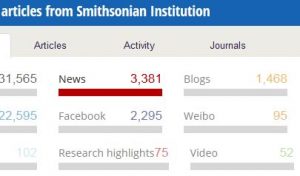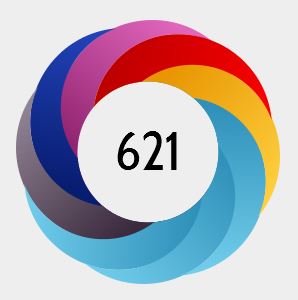During the 2016 fiscal year, the Smithsonian Research Online (SRO) program achieved several goals to ensure that publications authored by Smithsonian researchers were more easily discoverable and reused. This blog entry is meant to list some of those accomplishments and describe their significance.
Tag: altmetrics
The Smithsonian staff publications below are those that have generated the most media and online  activity for 2015. Congratulations to those authors whose work has been picked up by news, bloggers and other social media users and whose ideas therefore are propagated beyond readership of the source publication.
activity for 2015. Congratulations to those authors whose work has been picked up by news, bloggers and other social media users and whose ideas therefore are propagated beyond readership of the source publication.
This group was culled from among 1500 publications tracked by the online service, Altmetric and assigned a score based on online attention paid by interested parties. Those with the top 25 Altmetric scores are shown here.

The digital age of publishing scholarly journals allows a wider variety of methods to evaluate usage and readership than that of traditional print articles. Online activity can be captured for each article almost immediately after publication, including number of times an article is viewed and downloaded or mentioned in online news outlets, twitter, blogs and other social media sites. (For more on altmetrics, see the earlier Unbound post.)

This past week, you might have noticed the many news stories about killer cats. The research study about domestic cats’ impact on nature concluded that cats kill up to 3.7 billion birds and 20.7 billion mammals every year. Did you happen to pick up that the senior author on the paper was Peter Marra of the Migratory Bird Center, a research unit of the National Zoo, and one of his cowriters was Scott Loss, also of the MBC? While we are always excited by and proud of the research output of the Smithsonian, this is an example of a scholarly article having an impact in the public sphere—i.e. beyond just the scientific community. Does that matter? How does it matter? Is there a way for the organization sponsoring that research to measure impact of research output like this? These are the kinds of questions we can finally begin to tackle with the use of altmetrics.

